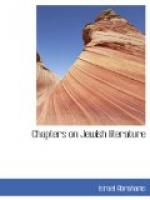MOSES RIETI.
Graetz.—IV, p. 230 [249].
MESSER LEON.
Graetz.—IV, p. 289 [311].
CHAPTER XIX
ETHICAL LITERATURE
Bachya Ibn Pekuda.—Choboth ha-Lebaboth.—Sefer ha-Chassidim.—Rokeach.—Yedaiah Bedaressi’s Bechinath Olam.—Isaac Aboab’s Menorath ha-Maor.—Ibn Chabib’s “Eye of Jacob.”—Zevaoth, or Ethical Wills.—Joseph Ibn Caspi.—Solomon Alami.
A large proportion of all Hebrew books is ethical. Many of the works already treated here fall under this category. The Talmudical, exegetical, and philosophical writings of Jews were also ethical treatises. In this chapter, however, attention will be restricted to a few books which are in a special sense ethical.
Collections of moral proverbs, such as the “Choice of Pearls,” attributed to Ibn Gebirol, and the “Maxims of the Philosophers” by Charizi, were great favorites in the Middle Ages. They had a distinct charm, but they were not original. They were either compilations from older books or direct translations from the Arabic. It was far otherwise with the ethical work entitled “Heart Duties” (Choboth ha-Lebaboth), by Bachya Ibn Pekuda (about 1050-1100). This was as original as it was forcible. Bachya founded his ethical system on the Talmud and on the philosophical notions current in his day, but he evolved out of these elements an original view of life. The inner duties dictated by conscience were set above all conventional morality. Bachya probed the very heart of religion. His soul was filled with God, and this communion, despite the ascetic feelings to which it gave rise, was to Bachya an exceeding joy. His book thrills the reader with the author’s own chastened enthusiasm. The “Heart Duties” of Bachya is the most inspired book written by a Jew in the Middle Ages.
In part worthy of a place by the side of Bachya’s treatise is an ethical book written in the Rhinelands during the thirteenth century. “The Book of the Pious” (Sefer ha-Chassidim) is mystical, and in course of time superstitious elements were interpolated. Wrongly attributed to a single writer, Judah Chassid, the “Book of the Pious” was really the combined product of the Jewish spirit in the thirteenth century. It is a conglomerate of the sublime and the trivial, the purely ethical with the ceremonial. With this popular and remarkable book may be associated other conglomerates of the ritual, the ethical, and the mystical, as the Rokeach by Eleazar of Worms.
A simpler but equally popular work was Yedaiah Bedaressi’s “Examination of the World” (Bechinath Olam), written in about the year 1310. Its style is florid but poetical, and the many quaint turns which it gives to quotations from the Bible remind the reader of Ibn Gebirol. Its earnest appeal to man to aim at the higher life, its easily intelligible and commonplace morals, endeared it to the “general reader” of the Middle Ages. Few books have been more often printed, few more often translated.




